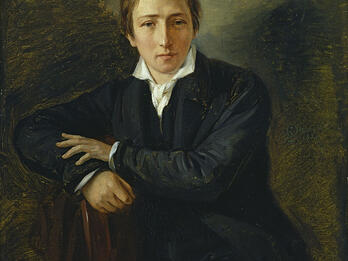Igrot Meshulam (Epistles of Meshulam)
Letter 5
Sivan, 5529 Livorno [1769]
In the name of G-d, the G-d of mercy!
In such measure as light exceeds darkness, such is the superiority of the people of this country over the people of Spain, where I lived for a while. The Spaniards are proud and haughty, and are too lazy to engage in work and manual labor, to such an extent that they choose to beg for bread from other paupers besides themselves rather than doing some work to alleviate their hunger through the labor of their hands. This is not the case in regard to the Italians—they are humble, and they welcome other human beings, each individual being accorded the honor properly due to him, and they are diligent in all manner of work, and in business; they adore science, and engage in the arts of song and melody, and drawing and construction, and they accord honor and render greatness to wisdom and its practitioners above all else. And notwithstanding their religion being the same as that of the Spaniards, their fine traits of character have nonetheless not been corrupted as a result of it; they do not detest those who oppose their religion, nor do they expel from their territories any other nation to prevent them having a share in their inheritance, nor do they afflict the alien dwelling among them.
Now in this large city, the population of which is roughly fifty thousand, almost one-half of that number are Jews; the majority of them adopt the customs of the Spanish Jews, while some of them are of Judeo German or Polish extraction; and they have splendid synagogues. They dwell in tranquility and at ease, and are engaged in all types of trades and businesses, in accordance with their desire. My heart is glad, and my glory rejoices, when I see my brethren living in security among their captors without impediment or mishap.
I have already informed you in one of my letters that I wrote to you in Madrid that you should not be astounded when you hear of the etiquette of the men of Europe when they are in the company of women for the purpose of eating and drinking with them; but in this country, even I was astounded at the sight; there is no company, no feast and no joyous occasion without the men and the women—young men and young maidens—mingling together; and the men honor the women, standing up in their presence and being ready to serve them, in contrast to the situation in our own lands, where the women are as handmaids to the menfolk. When I first witnessed this, I said to myself: “How corrupt this manner of etiquette is, and there will be no restraint upon the increase in lewdness amongst the people!” However, I later had second thoughts as to the harm of which I had spoken once I had been in their company on two or three occasions. And indeed the very opposite was the case, as this is the proper way to correct manners, and it is by such means that character traits within the young men can be reformed. And I then said: “This sort of conduct is indeed a brain-child of wisdom!” You know, my dear brother! You must surely be aware that the trait of self-shame constitutes the cornerstone of all the worthy traits of character that an individual can choose to possess, for so long as the saplings of wisdom and of ethics—of knowing the difference between good and evil—have not yet sprouted forth within his soul, there is nothing to fence him in, to guard him against doing something unbecoming, other than self-shame. And it is in this connection that our Sages, of blessed memory, declared: “The shamefaced are destined for Paradise!”—this being on account of the end result, for it is by virtue of this trait that he renders his general character wholesome, and he will be just in respect of his actions.
Now regarding this exalted character trait, the Creator, elevated be He, placed the charge of it upon the shoulders of women; namely, that a sense of shame should govern their lives and prevail over all their feelings, so that it guards the paths they pursue, to save them from the hands of the arrogant and of those who lead others astray, to prevent them from sinning. And accordingly, the more men accord honor to a woman, the more they strengthen within her soul the roots of the trait of self-shame, and she will be most afraid of debasing her honor in the estimation of man when lending her ear to the sound of lovemaking and paying attention to lustful words. And thus it is good for a man if, while still in his youth, he is in the company of chaste women such as these, who will serve as a wall of fortification and of strength to his mouth and his tongue, to protect him from uttering obscene expressions, let alone from committing any lewd acts, which would be regarded as outrageous and as a cause of derision among the circle of his friends. He will accustom himself to reflect wisely on everything issuing from his mouth, and be careful not to follow vile individuals, and to be concerned about his speech, lest the words that he utters become known and he will be put to shame. And it is by virtue of such acclimatization on his part that the worthy character traits will come to the fore within his soul—that is to say, of chastity, of humility, and of the good manners that raise the stature of a person and elevate his honor, and he will accordingly find favor and good understanding in the sight of all who see him. And now I will tell you of the general principle that I have learned: man is fashioned out of clay, and from his youth, the imagination of the thoughts of his heart chooses the physical and the material, and therefore the fundamental basis of the experimentation of man is man himself! And it was in relation to this that King Solomon declared: “Iron sharpens iron, and a man sharpens the countenance of his friend!” The etiquette and character traits of a man who has been sitting at home throughout his life and who has not come into contact with human society are of little significance to me; and even if he is possessed of a clear intellect and of goodwill, he is comparable, in my estimation, to bdellium that has just come from the source from which it was quarried, around which no light will shine until the hand of the furbisher and the polisher has been put to it, to work at it. This is the reality, my dear brother; the sages in every generation have tried and tested it, and the latter-day sages have complemented it by saying: “And a gracious wife sharpens the countenance of a young man!”
Credits
Published in: The Posen Library of Jewish Culture and Civilization, vol. 6.




